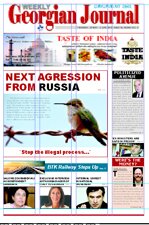Time for USAID to Open Up
28 March, 2013
 USAID is a part of the US government that gives out money in poor and mid-income countries around the world. In Georgia, it just granted a Washington (or actually Bethesda) based company a million dollars a year to evaluate Georgia's USAID projects over the next five years. This seems crazy to me. Leaving aside better ways to do this, there are plenty of companies in Georgia who could do this job. Wouldn't a firm based in Georgia be better able to evaluate the effectiveness of these programs than a group of former senior USAID managers based along the Beltway in Washington? These evaluations are secret, or at least very well hidden. In fact USAID is less transparent than most parts of the Government of Georgia. A more open conversation would be a good thing for Georgia and for USAID.
USAID is a part of the US government that gives out money in poor and mid-income countries around the world. In Georgia, it just granted a Washington (or actually Bethesda) based company a million dollars a year to evaluate Georgia's USAID projects over the next five years. This seems crazy to me. Leaving aside better ways to do this, there are plenty of companies in Georgia who could do this job. Wouldn't a firm based in Georgia be better able to evaluate the effectiveness of these programs than a group of former senior USAID managers based along the Beltway in Washington? These evaluations are secret, or at least very well hidden. In fact USAID is less transparent than most parts of the Government of Georgia. A more open conversation would be a good thing for Georgia and for USAID.The system used by USAID seems designed to prevent discussion about what they fund and why. It involves what for Georgia is a great deal of money and virtually all the people who are involved have made money from USAID, or may at some point in the future. Disclosure: when I was working for NDI from 1993 until 2004, my salary was paid via USAID, and now I am the chair of Transparency International Georgia (TI), which receives grants from organizations that receive money from USAID, but I make no money from TI, and never have. Also, these are my views not the views of TI. I have not received any money via USAID since 2004.
So USAID should open up, so that the Georgian public could get a better idea what it is funding. I don't believe it is secretive because its funding is somehow political, or corrupt, or is favoring this or that; I think it is secretive because so much of what it funds is ineffective.
Because USAID doesn't lend money and the government doesn't have to pay it back, it can be argued that it can be held to a lower standard than lenders like the multilateral banks. Certainly it is not the government of Georgia's job to bring this up or fix it; they are satisfied with whatever they get from USAID, and don't worry about the greater part of the funds that are wasted. Georgian journalists ignore USAID and the work they do because for the most part it doesn't significantly influence events. This is really an American problem more than a Georgian one. The fault and the solution rests with Americans that support foreign assistance in general and to Georgia specifically. The large proportion of USAID's funds go to American organizations similar to these evaluators who are getting this five million dollars over the next five years.
So what is to be done about this? As with any problem the first thing to do is to recognize that there is a problem. Although everybody I know who works near USAID discusses these problems privately, I don't see USAID making much effort to solicit the input of outsiders or creating some conduit for discussion. USAID is mistaken about what it actually is. In any given country, it thinks it knows best what should happen and wants to do those things it has decided upon. But in reality it doesn't "do" things or "have programs", it gives out money; it is too big and too bureaucratic to actually implement anything. It is a donor not a doer. It should focus on being a better donor rather than hiring very expensive firms from Washington to implement in detail USAID's plans and ideas, and then hire its former employees to tell them if those things were done or not. Better to break the funds into smaller amounts and allow people and organizations who know Georgia to get their own ideas funded. Under current leaderships there seem to be some steps in that direction; let's hope they continue.
USAID is very isolated, physically. They are located in the US Embassy compound, which is far from the center of Tbilisi and very difficult to enter. They tend not to leave, or at least I rarely see USAID staff in the city since they moved out to the Northwest Territories. They should move where the business of the city is conducted, for example along Rustaveli, or even better, to Kutaisi. Because they have a problem with isolation, they should take stops to be less isolated, but seem to do the opposite. They hold partners meetings, by invitation only, so that the management can talk to people they fund. Why not have some open meeting where people can enter easily? This is certainly easier and less coercive than forcing grantees to put USAID logos on everything.
Separating ideas from implementation doesn't work. This comes from the idea that you can "build democracy" or "build an economy" as you can build a road or a bridge; it doesn't matter if the builders like the road or bridge. But in the sectors in which USAID works, this is not the case. It creates businesses that don't care about what they do, or all they care about is doing whatever USAID wants and staying in their good graces. Better to fund different groups with different ideas to do what those people care about. As with any method of choosing, competitive bidding has its own baggage, and in the case of USAID competitive bidding now drives the entire development project. It shouldn't. This is a trend and a problem throughout the US government, but is more dangerous in development and social change.
There should be a longer time horizon and fewer deliverables. The US government has in general embraced contracting, bidding and outsourcing, and maybe USAID has been swept up in this. Yes congress does push USAID around, and yes Jesse Helms, a Republican Senator, made USAID a part of the State Department and yes Al Gore, a Democratic Vice President, pushed deliverables on the entire government, but USAID sure seems to have embraced all that and made it part of their culture. Where's the push back?
Deliverables may not be pointless when building a road or bridge but they sure are when a democracy or an economy is coming about. The idea of tracing causality for some economic or democratic improvement back to a USAID program is impossible. While setting goals over a longer time period, be more nimble along the way. There is such a thing as an opportunity that comes and goes quickly; in fact that is part of the definition of opportunity. In a transitional country, if there is a three year lag between planning and implementation according to the way you do things, figure out a new way to do things.
And finally, be more transparent. Put up the project documents, not just the PR text and success stories, but the actual proposals, budgets, and reports. Then have a forum where people can say what they want about it. That will be a much cheaper and higher quality program evaluation than even a million dollars a year can buy. And if there is fear about doing that, then it is a very natural question to ask why.
SEE GEORGIAN VERSION












































